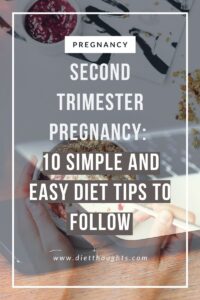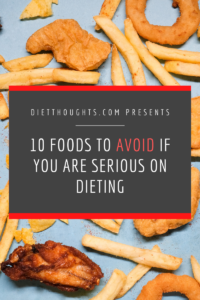The condition of extreme morning sickness or also known as hyperemesis gravidarum is a real, serious concern for many women. The normal condition of morning sickness is caused by hormone changes in the body and typically it lasts for 16 – 20 weeks of pregnancy.
Pregnant mothers usually will experience vomiting and nausea. However, if you face extreme conditions of morning sickness which cause you to keep vomiting until dehydrated then you need to adjust your diet accordingly.1
If you find yourself battling with morning sickness and looking to change your diet, you’ve come to the right place! While there’s no surefire way to guarantee you’ll never get morning sickness, these dieting tips may help you alleviate some of the symptoms.
Here are several things you should keep in mind when it comes to your diet.
1. Avoid fatty foods. It’s widely known that fatty foods tend to make a person feel nauseated, and that goes double for morning sickness. The last thing you want to do is sit down to a big plate of greasy fried chicken or hamburger if you’re already feeling queasy. If you insist on eating fatty foods, try tiny portions rather than large ones.
2. Don’t skip meals, but do eat smaller meals throughout the day. Meals should be small and frequent (5-6 per day, every 2 to 3 hours). You may feel like you want to skip meals, especially in the morning, when your nausea is at its worst. Don’t do it! Sure, it’s tempting to just sip water all day and take the edge off of your nausea. But don’t be so hard on yourself! Try eating three smaller meals throughout the day instead of two larger ones.2
3. Stay hydrated. It can be really hard to drink a lot of water when you’re suffering from morning sickness. But it’s important to keep drinking water as much as you can. It will help you feel better and more energetic.
4. Select foods containing mostly carbohydrates. Foods high in starch help reduce morning sickness symptoms, especially nausea, and make them tolerable.3 Carbohydrate-rich foods like bread, cereals, rice and potatoes may be better tolerated.
5. Don’t feel like you have to eat for two. No matter how hard that stomach is poking out, you don’t need to eat for two any more than anyone else does. Eat as much or as little as you need to stay healthy and hydrated but nothing more than that. You’re not going through all this morning sickness for no reason!
6.Eat a small snack before going to sleep at night. Try eating a piece of bread or a few crackers before getting to sleep in order to reduce nausea.4 It is best to try to include some protein in this snack. For example, cheese and crackers, yogurt, toast with peanut butter. It is also important to get out of bed slowly and avoid sudden movements.
7. If you can’t handle spicy foods, try to stay away from them. Once I realized as much, I stuck to just a few spicy foods like salsa and Tabasco sauce each day. But if you absolutely can’t handle spicy foods, don’t worry about it. Just eat those things sparingly so that you still get the vitamins and minerals you need but don’t end up in the emergency room because of it!
8.Do not lie down right after eating. I know the best position after we are too full is by lying down on the bed and getting asleep. But this time try to avoid doing that right after eating and get your head raised with 1-2 pillows later if you want to lie down.5
9. Avoid laying down for long periods of time. It’s tempting when nausea strikes at night and makes you feel weak at your knees and too tired to do much of anything besides climb into bed. But try to keep yourself busy as much as you can. I used to do a lot of housework and exercise at night, which kept my focus on the things I wanted to do rather than feeling like I was going to throw up.
10. Don’t worry about what your diet-switching looks like in public. It may be a little difficult to tell everyone you meet that you’re on a diet during the day, but it’s important not to feel embarrassed about the fact that you’re skipping meals. Most people are understanding and aren’t going to mention it if they see you eating a salad at lunch or soup for dinner.
Once morning sickness is gone, keep in mind that it’s important to get back on track with your diet as quickly as possible. If you still experience morning sickness despite these tips, talk to your doctor! It might be something else that needs treatment rather than just dieting.
While these dieting tips are only intended as a guide to help you cope with morning sickness, they should provide a good starting point.
For people who are actually suffering from morning sickness, however, there really isn’t anything you can eat or drink to help yourself feel better.
You’ll just have to deal with it until it passes. In the meantime, try staying hydrated and eat your favorite foods as often as you can.
Reference:
- Vomiting and morning sickness. (2020, December 3). nhs.uk. https://www.nhs.uk/pregnancy/related-conditions/common-symptoms/vomiting-and-morning-sickness/
- McHugh, D., Keever, J., & Lo, A. (2021). Hyperemesis Diet. Southern New Hampshire Health. https://www.snhhealth.org/SNHH/media/HeaderImages/Hyperemesis-Diet.pdf
- Foods that help manage hyperemesis gravidarum. (2017, September 4). Nutritionist Resource – Find a Nutritionist Near You. https://www.nutritionist-resource.org.uk/press/hyperemesis-gravidarum-and-morning-sickness-what-to-eat-and-which-foods-to-avoid
- Hyperemesis diet. (2021, March 4). Drugs.com. https://www.drugs.com/cg/hyperemesis-diet.html
- The Nutritional Management of Nausea and Vomiting During Pregnancy. (2021). Niagara Health | Santé De Niagara. https://www.niagarahealth.on.ca/files/Hyperemesis2014.pdf




Such a rarely discussed topic of morning sickness, especially for me as a my man. Good to see that the author bring up the references for this article too. Thanks. It’s a really beneficial information for me. 🙂